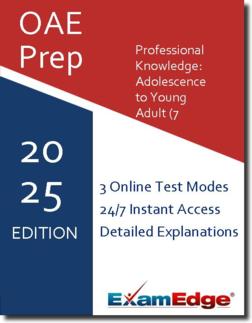OAE Professional Knowledge: Adolescence to Young Adult (7-12 (003) Practice Tests & Test Prep by Exam Edge - Topics
Based on 28 Reviews
- Real Exam Simulation: Timed questions and matching content build comfort for your OAE Professional Knowledge: Adolescence to Young Adult (7-12 test day.
- Instant, 24/7 Access: Web-based OAE Assessment of Professional Knowledge Adolescence to Young Adult (7-12) practice exams with no software needed.
- Clear Explanations: Step-by-step answers and explanations for your OAE exam to strengthen understanding.
- Boosted Confidence: Reduces anxiety and improves test-taking skills to ace your OAE Assessment of Professional Knowledge Adolescence to Young Adult (7-12) (003).

Understanding the exact breakdown of the OAE Assessment of Professional Knowledge Adolescence to Young Adult (7-12) test will help you know what to expect and how to most effectively prepare. The OAE Assessment of Professional Knowledge Adolescence to Young Adult (7-12) has 100 multiple-choice questions and 2 essay questions. The exam will be broken down into the sections below:
| OAE Assessment of Professional Knowledge Adolescence to Young Adult (7-12) Exam Blueprint | ||
|---|---|---|
| Domain Name | % | Number of Questions |
| Student Development and Learning | 24% | 24 |
| Assessment, Instruction, and the Learning Environment | 50% | 50 |
| The Professional Environment | 26% | 26 |


